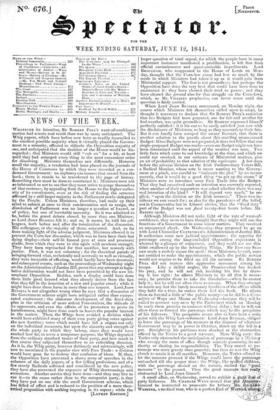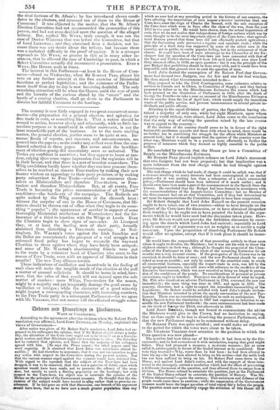NEWS OF THE WEEK.
WHATEVER its intention, Sir ROBERT PEEL'S want-of-confidence motion had a more real result than was by many anticipated. The Whig papers, which have before now been so readily reconciled to -the smallest possible majority when it virtually placed the Govern- ment in a minority, affected to ridicule the Opposition majority of .one, and anticipated that the decision of the House would be dis- regarded; that Ministers would still "rub on" for a bit, at least until they had arranged every thing in the most convenient order for dissolving. Ministers themselves saw differently. However small the majority, a resolution had been placed on the journals of the House of Commons by which they were recorded as a con- demned Government : no sophistry can remove that record from the book; there it stands to be transferred to the page of history. Something then must be done to counteract it : Ministers were not ao infatuated as not to see that they must strive to purge themselves of that sentence, by appealing from the House to the higher autho- rity of its constituents, even at the risk of finding the sentence affirmed by a still larger majority in the Parliament newly-delegated by the People. Unless Ministers, therefore, had made up their mind to submit at once to their condemnation and to resign, the 'dissolution of Parliament was no longer a question of hazard, or of policy, but one of inevitable necessity. So it was admitted to be, before the grand debate closed, by more than one Minister; so Lord JOHN RUSSELL felt it ; and so, it seems, he told his col- leagues, both before and after the termination of the discussion. His colleagues, or the majority of them, concurred. And, so far from making light of the adverse judgment, Ministers allowed it to prevent the Corn-law discussion, which was to have been their last flying display—their self-lit funeral pyre at once and procreant -cradle, from which they were to rise again with newborn strength. They have been reproached for that sacrifice, but scarcely with justice. First, it was not voluntary ; for the theatrical parade of bringing forward what, technically and avowedly as well as virtually, they were incapable of effecting, would hardly have been decorous; and subsequent events, such as the proceedings of Wednesday night ,on the Administration of Justice Bill, prove that any attempt at legis- lative deliberation would not have been permitted by the now tri- umphant Opposition. Besides, such a display could have done them little good beyond what they already derive from the fact that they fall in the assertion of a new and popular creed ; while it -might have done them harm in more than one respect. Lord JOHN RUSSELL is not altogether wrong when he says that a discussion of the Government scheme might have mitigated rather than exaspe- rated excitement : the elaborate development of the fixed-duty elan in the criticism of more ardent Free-traders, the ridicule of its opponents, and even the efforts of its promoters to prove its harmlessness, might have done much to lessen the popular interest in the matter. Then, the Whigs have avoided a division which would have exhibited many of their own party giving votes against the new doctrine ; votes which would have left a stigma not only on the individual recusants, but upon the sincerity and strength of the whole party to which they belong, since they would have marked how far, to serve a temporary purpose, the Whigs departed from the ordinary standard tenets of their party, and how much in that course they subjected themselves to an enfeebling disunion. As it is, the Whig party, however dubiously and mistrustingly, will now be associated in the popular view with Free Trade : a division would have gone far to destroy that confusion of ideas. If, then, the Opposition have prevented a showy array of speeches in the columns of the daily papers, of a few telling professions, and of a few sturdy Radicals softened and conciliated by the new policy, they have also prevented the exposure of Whig shortcomings and secessions. Another service they have done—and they may live to rue it—to the cause rather than to the antagonist party, is that they have put on one side the small Government scheme, which Ilan failed of effect and is reduced to the position of a more theo- %Utical proposition with nothing imposing in its aspect ; while the
larger question of total repeal, for which the people have in many important instances manifested a predilection, is left free from
official encumbrances and quasi-amicable impediments. Lord BROUGHAM, who reappeared in the House of Lords on Mon- day, thought that the Corn-law cause had lost as much by the mode in which Ministers had taken it up as it would gain from Ministerial support. The fear is not groundless; but perhaps the Opposition have done the very best that could have been done to counteract it : they have cleared their road to power ; and they have cleared the ground also for that struggle on the Corn-laws, which, as Mr. VILLIERS prophecies, can never cease until the question is fairly carried. When Lord JOHN RUSSELL announced, on Monday night, the course which Ministers felt themselves called upon to adopt, he thought it necessary to declare that Sir ROBERT PEEL'S suspicion that two Budgets had been prepared, one for fair and another for foul weather, was quite groundless. Sir ROBERT expressed himself perfectly satisfied : it is his cue to be easily satisfied just now with the disclaimers of Ministers, so long as they succumb to their fate. But it can hardly have escaped the astute Baronet, that there is another solution to the puzzle about this startling unannounced Budget: if two Budgets were not prepared, it does not follow that one single-purposed Budget was ready—even one Budget might not have been determined until the aspect of the weather was seen. Two little facts which came to our knowledge at the time, and which we could not overlook in our estimate of Ministerial motives, give an air of probability to that solution of the equivoque. 4 few days before the adverse division on the Irish Parliamentary Voters Bill, a Radical Member, whose vote is never wanting to the Govern- ment at a pinch, was careful to " insinuate the plot," by no means secretly, that it would be a good thing " to get up the steam " if Ministers were to introduce some Free Trade into the Budget. That they had conceived such an intention was currently reported, when another of their supporters was asked whether there was any real intention of the kind ? " It will depend very much," he re- plied, " upon the division on the Irish measure." These two in- cidents we can vouch for ; as also for the prevalence of the belief, netin Conservative but in Liberal circles, 'that the "fixed duty" part of the Budget was not fixed twenty-four hours before Mr. BARING spoke. Although Ministers did not make light of the vote of want-of- confidence, they seem to have thought that they might still use the functions of a Government in some minor matters. They received an unexpected check. On Wednesday, they proposed to go on with Lord Chancellor COTTENHAM'S Administration of Justice Bill. It authorizes some new judicial appointments : the appetite for patronage among the long-excluded Opposition expectants is whetted by a glimpse of enjoyment, and they could not see this titbit swallowed up by the retreating Whigs. Sir EDWARD SUG■ DEN made a rush to secure the spoil: these Ministers, he said, were not entitled to make the appointments, which the public service would not require to be filled up till the autumn. Sir ROBERT PEEL did not repress this aggressive movement among his troops. Like a skilful angler, the Premier-elect has hooked his prey, and he will not risk breaking his line by draw- ing it too tight : he allows Ministers to do all that is neces- sary; he permits them to take the dissolution—when he cannot help it ; but he will not allow them to escape. When they attempt to retain any but the barely necessary functions of the offices which they hold for a time, he makes them feel the hook. He allows them to forestal a little of the public money—as he did in a Com- mittee of Ways and Means on Wednesday—because they will be called to account very soon by the Parliament which on Monday he made them promise to summon without delay ; but he will not allow them to forestal the patronage which may be the perquisite of his followers. The perquisite seems also to have been a main point with the Whig Law-reformers: Lord JOHN RUSSELL, obliged to leave the patronage of his measure at the disposal of whatever Government may be in power in October, threw up the bill in a pet. Straightway his partisans were shocked at the obstruction offered by the Tories to a good measure. Mere Whig cant:. the Tories only obstructed the anticipation of patronage by a Ministry who occupy the room of office though scarcely possessing its au- thority or sharing its responsibilities. The Tory snatch at pa- tronage was more greedy than graceful; but then so was the Whig clutch to retain it at all sacrifice. Moreover, the Tories offered to let the measure proceed if the Whigs would leave the patronage untouched till the proper time : the Whigs, like spilled ebitiren, with the patronage denied on the instant, dashed - tly:r " good ' measure" to the ground. Thus the good measure_ .*a-C
obstructed by Lord JOHN himself.
A small affair, on Wednesday, served to exhibit party littleness. Mr. CHARLES WYNN moved that General be instructed to prosecute for bribery WEBSTER, a medical-man, who is a perfect Earl of the rival factions of St. Alban's : he has introduced eleven candi- dates to the electors, and returned ten of them to the House of Commons! It was objected to the motion, that the St. Alban's Election Committee had not recommended the prosecution of this person, and had not even decided upon the question of the alleged bribery. But, replied Mr. WYNN, truly enough, it was not the case of Doctor WEBSTER that was before the Committee, but that of Lord LISTOWEL ; and they abstained from a decision, not be- cause there was any doubt about the bribery, but because there was a technical difficulty in the proof of agency. It is a stronger reproach to Mr. WYNN, so precise in this as in many other in- stances, that he allowed the case of Cambridge to pass, in which a Select Committee actually did recommend a prosecution. Even a WYNN, like Homer, nods at times.
The interest in this Parliament—at least in the House of Com- mons—closed on Wednesday, when Sir ROBERT PEEL placed his veto on any further attempt at the free exercise of Ministerial functions or perfect legislation ; and the existence of the Parlia- ment itself from day to day is now becoming doubtful. The only remaining attraction will be when the Queen, amid the roar of guns and the hurrahs of the curious elated by the "event" and the bustle of a coming- election, shall go down to the Parliament to dismiss her faithful Commons to the hustings.



























